Trump presidency: Your questions answered
- Published
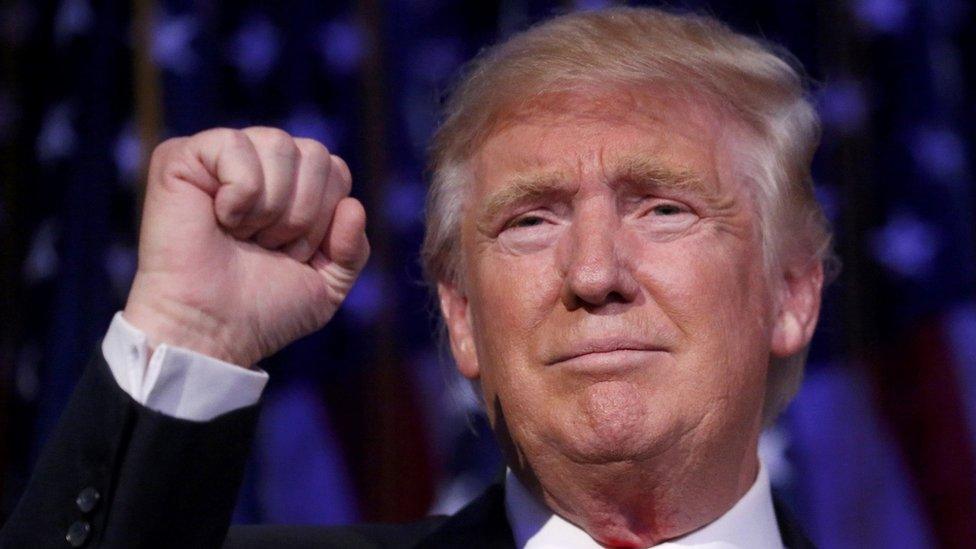
Donald Trump's election as the next US president, along with a Republican-controlled Congress, brings with it an avalanche of questions about the election itself - and about what happens next.
From health insurance to same-sex marriage, global warming and Obamacare - American citizens and people around the world want to know what the future will hold under the new administration. Here we tackle some of the questions being raised online and by BBC audiences.

Will Trump chase illegal immigrants from the US?
Five days after the election, Mr Trump told US broadcaster CBS that he would deport or jail between two and three million illegal migrants initially. Those targeted would be migrants with criminal records, such as gang members and drug dealers.
Overall, there are about 11 million illegal immigrants in the US, and Mr Trump has published a 10-point plan on immigration, external which includes overturning amnesties introduced by President Barack Obama, strictly enforcing immigration laws and deporting those who do not have correct documents.
Trump vows to target 'criminals' first
In the US, though, illegal immigrants do have a right to due process, so many more judges and prosecution lawyers will need to be appointed to practically make this happen and this could clog up the court system for years to come, external. Congress would need to approve funding for this process.
Mr Trump is expected to revoke President Obama's executive orders of 2014,, external which gave hundreds of thousands of illegal immigrants temporary legal status and an indefinite reprieve from deportation. Executive orders, external allow presidents to introduce their own legally binding policies without Congressional approval.
Mr Trump has said that on his first day in office, external he will sign orders to speed up the removal of "criminal illegal immigrants", but that he will also end President Obama's non-enforcement policy and will detain people found illegally entering the US until they are deported. He has promised to increase the number of enforcement officers needed to accomplish this.
In its 2015 report,, external the Migration Policy Institute, a Washington-based non-partisan think-tank, said there were about 820,000 illegal immigrants with criminal records. Many of them had been arrested for crossing illegally into the US.
Meanwhile, a 2012 report, external by the non-partisan Congress Research Service think-tank said that only a small minority of all the unauthorised immigrants had committed violent crimes.
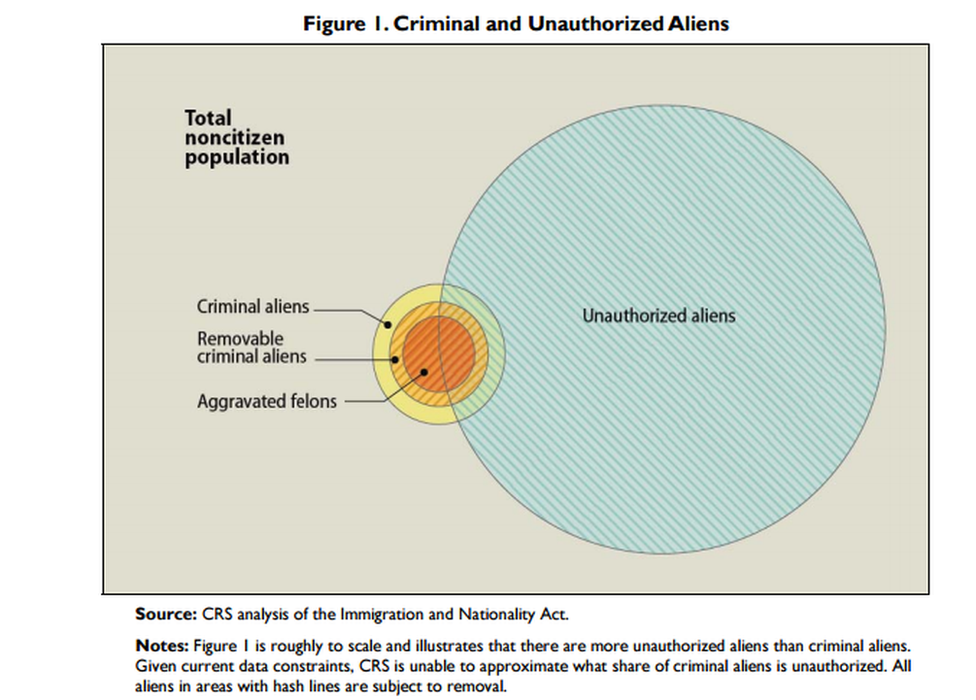
Criminal and unauthorised aliens in US by Congressional Research Service
"All unauthorised aliens are potentially removable, indicated by crosshatches in the figure, but the majority of them have not been convicted of a crime and are therefore not classified as criminal aliens," the report said.
It did not provide an overall number of illegal immigrants in the US.

What will happen with ongoing lawsuits against Trump?
Even by the standards of billionaire businessmen, Donald Trump is an unusually litigious man who has been involved in thousands of lawsuits - both those he has launched and those he has defended - over the years.
The president-elect is currently facing 75 active lawsuits, according to an analysis by USA Today newspaper, external.
By far the most pressing - and potentially embarrassing for the newly elected leader - are several lawsuits launched over the now-defunct Trump University, which centre on former students claiming they were charged tens of thousands of dollars for courses that promised to unlock the secrets of real estate entrepreneurship - and didn't. Mr Trump denies the claims.
Because these were launched long before he assumed office, no presidential immunity statutes apply and Mr Trump will have to attend court when required.

Could Trump be impeached?
Article II of the US Constitution states that the president "shall be removed from Office on Impeachment for, and Conviction of, Treason, Bribery, or other high Crimes and Misdemeanors"
If Mr Trump loses the case against him on Trump University that may leave him open to impeachment, some legal scholars suggest.
Christopher L Peterson, professor of Law at the University of Utah, argues that, external "fraud and racketeering are serious crimes that legally rise to the level of impeachable acts".
Beginning the process of impeachment requires a majority vote in the House of Representatives. Whether the Republicans, who hold the majority of seats, would want to impeach their own president is another matter.

What are Trump's plans for Social Security?
Mr Trump has not proposed reductions on Social Security.
The funding needed for Social Security is expected to balloon over the next decade, and it's unclear where the money to pay for it will come from without tax increases.
The Republican Party's official 2016 platform says: "Current retirees and those close to retirement can be assured of their benefits. Of the many reforms being proposed, all options should be considered to preserve Social Security."
However, Mr Trump has appointed Michael Korbey to his transitional team to head Social Security.
The Associated Press reports that "as a senior adviser to the Social Security Administration, Korbey was an advocate for the George W Bush administration's failed attempt to privatise Social Security".

Who is Mike Pence, Trump's vice-president-elect?
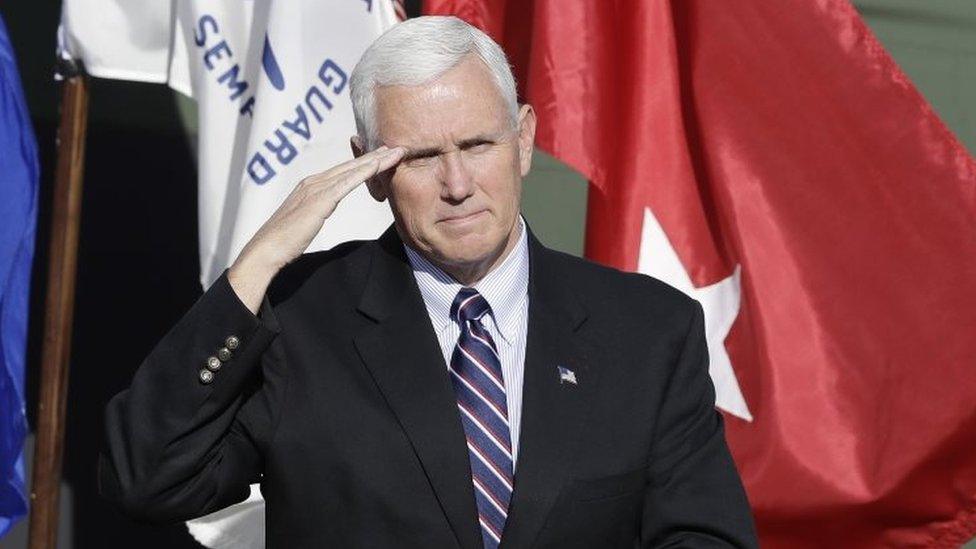
Indiana Governor Mike Pence has described himself as "a Christian, a conservative and a Republican, in that order".
The 57-year-old has been a loyal supporter of Mr Trump, but - at times - he has not been afraid to speak his own mind.
Prior to being named the business mogul's running mate in July, Mr Pence had criticised Mr Trump's proposed ban on Muslims entering the US as "offensive and unconstitutional".
And during his vice-presidential debate performance on 4 October, Mr Pence defended his own positions - not necessarily those of Mr Trump - when challenged.
Mr Pence has served as governor of Indiana since 2013, but he also has 12 years of legislative experience as a member of the US House of Representatives.
He is a favourite among social conservatives who boasts considerable experience in Washington.
Mr Pence had considered running for president in 2016.

Will same-sex marriages be upheld and continue to be recognised?
Donald Trump has said in interviews over several years that he is opposed to same-sex marriage, although he's also said he has attended a gay wedding.
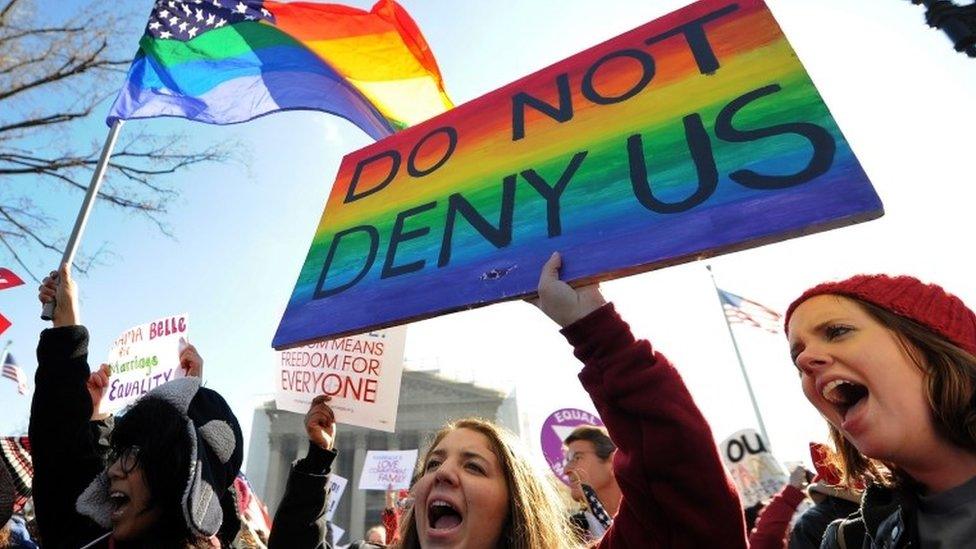
He says the issue should be decided at state level, rather than nationally, and that he was unhappy with the 2015 Supreme Court ruling earlier this year that made same-sex marriage legal across the country. After that decision he appeared to agree that it was a "dead issue", external and suggested that he didn't support attempts to overturn the ruling.
But earlier this year he told Fox News he would "strongly consider", external appointing Supreme Court justices who would reverse it.
He has not made the issue a priority. His Vice President-elect, Mike Pence, is strongly opposed to gay marriage.

How many people voted in the US election?
Election officials do not finalise the data until about two weeks after polling day. But the US Elections Project estimates that 128.8m Americans voted, out of 231.5m eligible voters - a turnout rate of 55.6%. In 2012, turnout was 58.6%, and in 2008 it was 62.2%.

Who won the popular vote?
Hillary Clinton looks set to win the popular vote by a narrow margin.
The latest count shows that Mrs Clinton won 60,981,118 votes, which amounted to 47.8% of the total, compared with Donald Trump's 60,350,241 votes, or 47.3%.
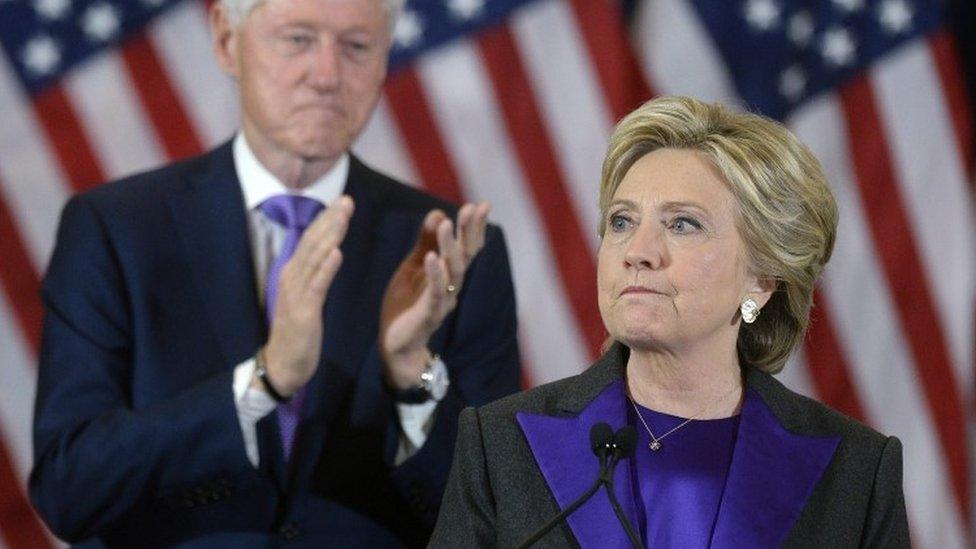
However, the system under which the US elects its president means that candidates need to win races in individual states to pick up "Electoral College" votes. As a result of victories in key "swing" states (those more likely to change hands between the two main parties) carrying large numbers of Electoral College votes, Mr Trump won 290 Electoral College votes - comfortably ahead of Mrs Clinton's 228. Two states, Michigan and New Hampshire, have not yet been declared.
Other candidates polled 6,260,817 votes.

How old were the candidates?
To answer one of the most-asked questions on Google Trends - Donald Trump is 70 and Hillary Clinton is 69.

When does Trump take office?
He will be inaugurated at noon on Friday, 20 January 2017. In the meantime he will name his team, develop policy positions, and have access to government briefings, including classified information on national security and military operations.

Will President Trump live in the White House?
In an interview with The Hill website, external last year, Mr Trump appeared to scotch rumours that he would break with long tradition and not live in the presidential residence and principal workplace in Washington DC.
"Yes, I would live in the White House because it's the appropriate thing to do," he said. He went further, adding that he would "rarely leave the White House because there's so much work to be done".
Since Mr Trump won Tuesday's election, the Federal Aviation Administration has implemented flight restrictions, external over the area of his home on New York's Manhattan island that expire on 21 January, the day after his planned inauguration and expected move to the White House.

Will Trump continue to run his businesses when president?
Apparently not. In an interview with CNN, external, Donald Trump's lawyer said the privately owned Trump Organization - a company with US and international holdings including hotels, golf courses and commercial and residential property - would be held in a "blind trust" run by Mr Trump's adult children, Donald Junior, Ivanka and Eric.
Whether such an arrangement constitutes a true blind trust that avoids conflicts of interest is being questioned by critics, as Mr Trump will still be aware of his business holdings and how policies might affect them, and direct relatives will be running them on a day-to-day basis.

When is Trump going to start building the wall on the Mexican border?
Donald Trump has made building a wall along the border to stop illegal immigration a refrain of his campaign.
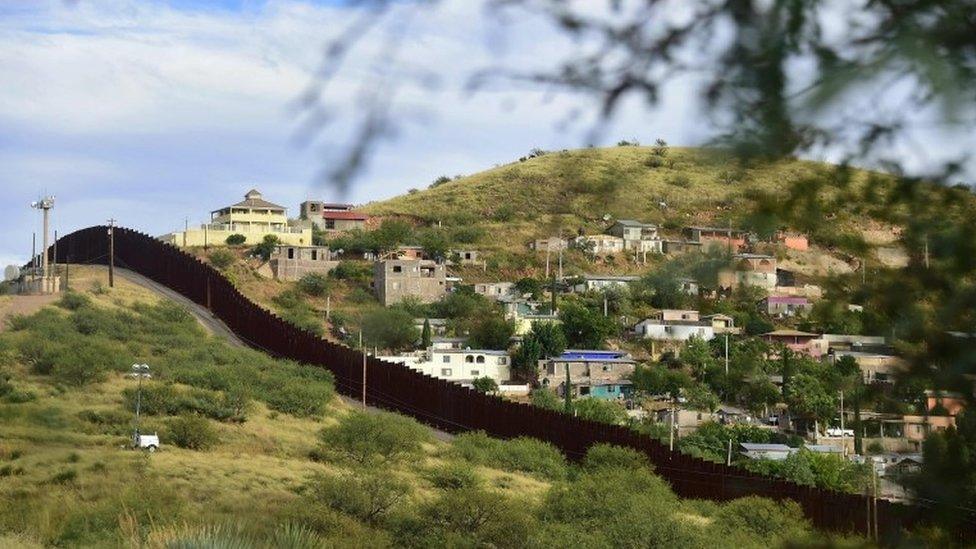
Will a wall replace this fence?
In an interview on CBS Mr Trump has said "a wall is more appropriate" in some parts but "there could be some fencing".
A document on his website, external outlines how he would "make Mexico pay". It would begin on "day one" with amending money transfer rules so that no "alien" would be able to wire money out of the US without showing documents establishing their lawful presence in the country. Mexico has rejected his assertion that it will pay.
Given the expected cost and scale of the wall, the challenges of acquiring privately owned land along the border route to build it on, and Congressional backing from sceptical Republicans, many analysts think it will never be built. Instead, they expect an increase in border policing and tightening of immigration rules. Some Trump advisers have talked of a "virtual" or "technological" wall, though he has insisted it will be built.

I have health insurance through Obamacare. Will I lose it?
Donald Trump has pledged to repeal the Affordable Healthcare Act, which he intends to scrap "very, very quickly".
However, Mr Trump has now said he is open to leaving intact key parts of President Barack Obama's healthcare bill.
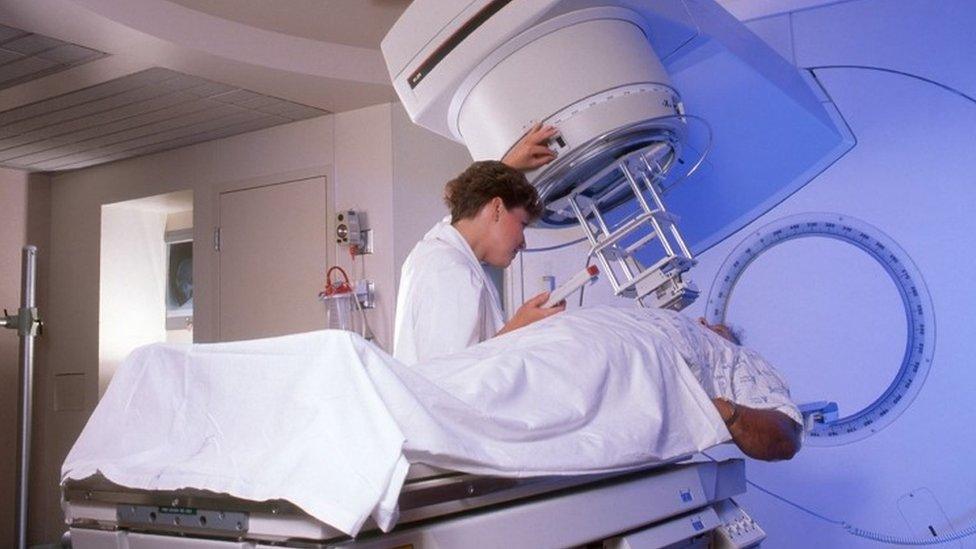
He has said he will keep the ban on insurers denying coverage for pre-existing conditions.
He told the Wall Street Journal that he also favoured allowing young adults to be insured on their parents' policies.
BBC North America reporter Anthony Zurcher notes that: "the challenge for the president-elect is that the Obamacare features he praises - such as its mandate that insurers cover pre-existing medical conditions - are made possible by portions of the law he has condemned, like requiring all Americans to obtain insurance.
Keeping the law's carrots while abandoning its sticks could prove difficult.
Complicating the matter is that a "revise and reform" effort may not fly with Mr Trump's ardent supporters and the cadre of arch-conservative politicians in Congress, who want to tear up the law "root and branch".
Mr Trump often broke with Republican orthodoxy while campaigning and didn't pay a political price. He may learn that as president he won't get far without his party establishment's help."

Can Trump launch nuclear bombs by himself?
A US president has the authority to launch a nuclear attack within minutes. The nuclear briefcase (or "football", as it's known) kept close to him at all times contains the codes he must use to authenticate his identity when ordering military commanders to carry out a nuclear strike. The Defence Secretary is also required to authenticate the codes, but does not have the authority to veto the decision. A complex system of people, procedures and technology then kicks into action to launch a nuclear attack.
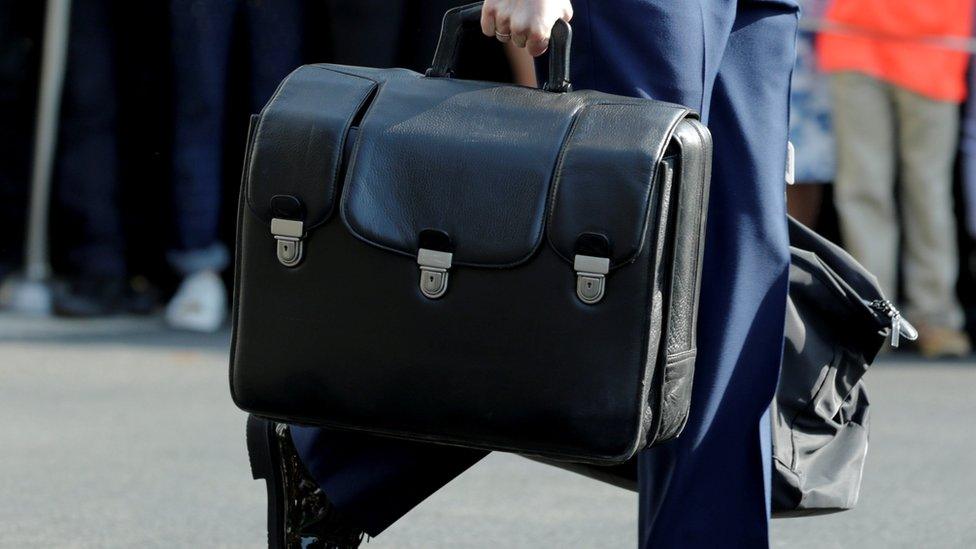
The nuclear codes are contained in a briefcase known as the "nuclear football"
The system is designed to allow the US president to respond to an imminent nuclear attack, with as little as 10 minutes warning. The briefcase also contains a "menu" of pre-planned strike options, targeting different parts of the world in different ways.
Donald Trump's critics have questioned whether he has the temperament, and intellectual capacity, to weigh complex information under the pressure of a nuclear alert - and have also raised concerns about someone known for his temper having access to the nuclear codes.
His statements have given mixed messages on his approach, and he has stressed that "unpredictability" is important where military - including nuclear - options are involved.
In April he told NBC, external he would "be the last to use nuclear weapons" describing their use as "a horror".
"I will not be a happy trigger like some people might be, but I will never, ever rule it out," he said.
But a month earlier he said: "Somebody hits us within ISIS, you wouldn't fight back with a nuke?", external

Will he stop abortion?
In March, Donald Trump said that abortions should be illegal and he supported "some form of punishment" for women who had them. However, he later backed down from this, saying the legality of abortions should be left up to individual states, with any criminal penalties being reserved for abortion providers.
Mr Trump has said that he supports an abortion ban exception in cases of "rape, incest and [danger to] the life of the mother". He has also said he opposes the use of Medicaid to cover abortions for low-income women, and that with a Republican-controlled Congress he is willing to make that a matter of law.
Most abortions in the US are carried out by clinics, with Planned Parenthood being one of the largest providers of the service. Mr Trump has promised to stop funding the organisation, which provides reproductive healthcare - including birth control measures - to women across the United States.
But Planned Parenthood, whose affiliates operate around 650 health centres nationwide, has vowed to continue its work, tweeting, external: "Planned Parenthood has been here for 100 years. One thing is clear we'll never back down & we'll never stop providing care for our patients."

How will access to birth control be affected?
Women with health insurance can currently obtain contraceptives for free under the Affordable Healthcare Act - known as Obamacare - which Donald Trump has vowed to dismantle.
According to Vox, external, he could exclude birth control from the programme simply by changing a definition, rather than as part of wider moves to overturn the act.
But Mr Trump has not said he plans to do this - or said whether he would include contraceptives in a scheme to replace Obamacare. He has said he backs access to contraceptives without a prescription, external.
There's also concern about Donald Trump's plan to cut Planned Parenthood's funding. He has said the money will be reallocated to other providers, but critics say these would not be able to fill the gap in provision.
Fears that birth control will become harder and more expensive to access have prompted a flurry of interest in long-term contraceptive implants known as IUDs. Women are advised to consult a doctor on contraceptive options.

Will Donald Trump seek to halt or reduce legal immigration to the US?
Mr Trump has stated that he wants jobs to go to American workers first and that he wants to reduce the numbers of foreign workers admitted to the US.
Under his administration he says immigrants will be selected among other things on their ability to be financially self-sufficient and he has said people will be subject to "extreme vetting" and an "ideological test, external".
There has been no detail given on what this vetting and testing would involve and experts point out that the US immigration code already includes ideological tests and screens those attempting to enter the country.
Mr Trump also wants to temporarily suspend immigration from regions that 'export terrorism and where safe vetting cannot presently be ensured, external'.
Over the years Congress has granted wide powers to the president to change immigration rules and he could institute even greater background screening checks. However, there is debate about whether he could impose lower limits on the number of people who can immigrate or change current green card categories, without Congressional support.
According to US law, external the president does hold the authority to "suspend the entry of all aliens or any class of aliens, external" if the group's entry "would be detrimental to the interests of the United States." That can extend for as long as the president deems necessary.

I'm a Muslim, will I still be allowed to go on holiday to the US?
After last year's mass shooting in San Bernardino, California, when 14 people were killed, Mr Trump issued a press release calling for a "total and complete shutdown" on Muslims entering the US "until our country's representatives can figure out what is going on".
The statement attracted condemnation from around the globe and significantly from his Vice President-elect Mike Pence, who called the proposal "offensive and unconstitutional".
Over the months it appears Mr Trump may have abandoned his plan. In October, Mr Pence told journalists he no longer protested against the proposed ban "because it's not Donald Trump's position now", external.
After the election, the page on his website, external that set out the policy appeared to have been removed, replaced by a redirect to the site's main page. That raised questions about whether it was being dropped, but the page was later restored and the Trump campaign told the Washington Post, external it had been an error.

Can Trump undo accords and agreements on climate change?
Mr Trump has expressed scepticism about the science behind climate change and wants to get the US out of the Paris Climate Agreement deal. He says the deal is "bad for US business" and will allow "foreign bureaucrats control over how much energy we use".
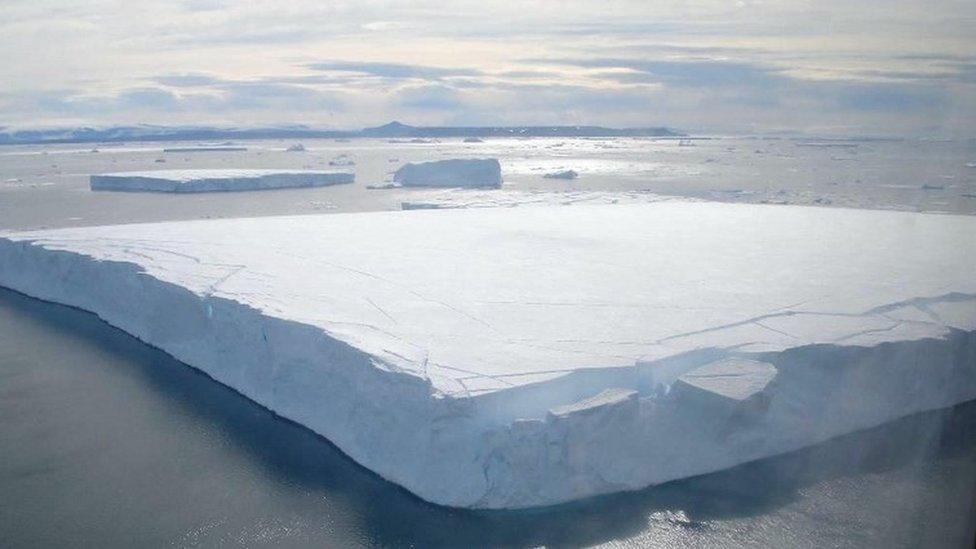
In 2012, he tweeted, external that the concept of global warming was created by the Chinese to make US manufacturing non-competitive. But last January, he described that comment as a joke, external.
However, the Paris Agreement has been ratified and is already part of international law. While Mr Trump probably would easily find sufficient political backing to withdraw US support, the formal process to do this would take four years.
Since the election, delegates from 200 countries at the UN climate talks in Morocco have said they are prepared to move ahead with work on the Paris Agreement without the US.

Will Trump weaken Nato and put US allies at a disadvantage?
The president-elect's foreign policy, expressed in his "America First" plan, states that it will always prioritise US interests, and that foreign allies should bear more of the cost of military action and defence.
Mr Trump has made it clear he intends to reassess US involvement in the Western military alliance Nato.
In an interview in July with the New York Times, he stated that in the face of a future attack from Russia, Nato members could only expect the US to defend them if they "have fulfilled their obligations to us, external" - an apparent breach of the alliance's mutual-defence treaty.
Following his election, European leaders have asked Mr Trump to clarify his position, external, while Nato Secretary General Jens Stoltenberg reminded him that the treaty commitment was "something absolutely unconditioned, external".
Whether a compromise can be reached is, at present, not known.

Will Trump attack North Korea?
Former US Assistant Secretary of State PJ Crowley told the BBC: "At some point, probably quite early on, Kim Jong-un will stand up (spreads arms wide) and say to President Trump: 'We're a nuclear power. What are you doing to do about it?' That will be a key test for President Trump."
Much of Donald Trump's foreign policy remain unclear.
In May, he did suggest that he would sit down with North Korean leader Kim Jong-un to try to stop Pyongyang's nuclear programme, proposing a major shift in US policy toward the isolated nation by saying: "I would speak to him, I would have no problem speaking to him."
Pyongyang endorsed him and called him a "wise politician" and a "far-sighted candidate", and cheered his comments that South Korea should pay more for US troops to remain on its soil.
But following the election, North Korea has made it clear it does not intend, external to give up its nuclear weapons.
Addressing this question in the last few days, Graham Allison, external, one of the world's leading experts on nuclear proliferation and containment, said: "One of the many problems with Trump is that he has apparently not worked his way through any of the possible scenarios regarding a North Korean threat. Our commander-in-chief is the only person who stands between us and the possibility of getting blown to hell. Whether he would be impetuous, or impatient, or not know the material, we just don't know."
Mr Trump has also said he would be open to allowing Japan and South Korea to build their own nuclear arsenals, external for their protection against North Korea and China.

What are Trump's policies regarding Africa?
The US spends billions on Africa through aid and investment, but Donald Trump has said very little about how he intends to deal with the continent.
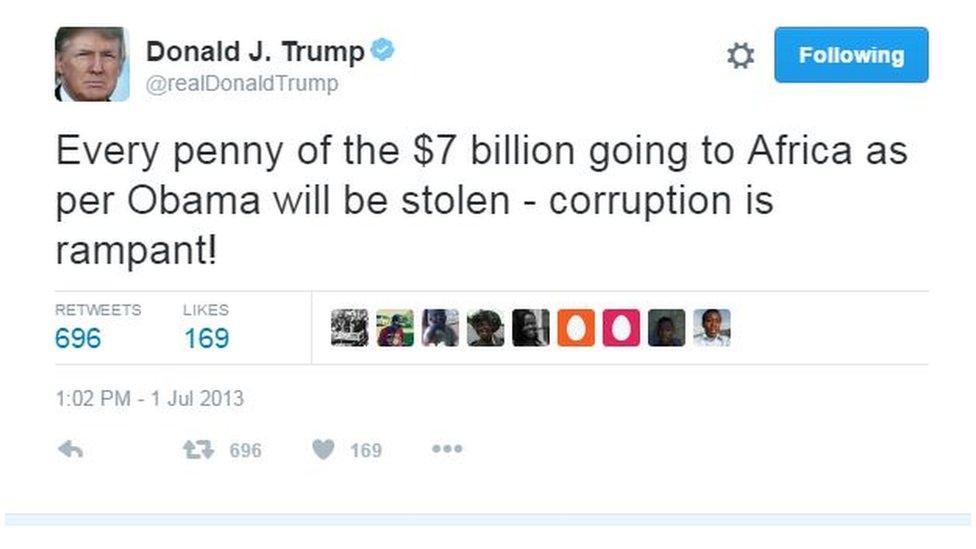
On foreign aid in general, he has said he would rather see money spent in the US. This raises concerns over the future of US aid schemes such as the Power Africa project, which aims to double the number of people with electricity across the continent and the Pepfar plan to tackle HIV/Aids.
His tough talk on so-called Islamic State, support for torture and anti-Muslim immigration statements all suggest a probable hard-line approach to security in North Africa, where US military involvement has increased in recent years.

Is Canada now going to get many more American immigrants?
When the news of a possible Trump victory started to emerge, Canada's immigration website crashed, a phenomenon that was attributed to higher than normal level of traffic. There was also a surge of traffic to the New Zealand immigration website and the Google search "Australia immigration" hit a massive spike.
It is uncertain at this stage if this wave of interest by US citizens will result in people actually deciding to make the move to Canada or elsewhere.
However, while getting a travel visa to Canada would be straightforward for many Americans, moving permanently is a different issue.
Canada has several different immigration programmes and each has different application and eligibility requirements. According to specialist immigration lawyers, having a special skill or profession, joining immediate family members already living in Canada, or claiming political asylum as a "protected person" are the three main ways to make the move.
But for others, factors such as nationality, age, language ability, education and work experience will all be thoroughly scrutinised.

Will a Trump presidency be favourable to a post-Brexit UK?
Unlike President Obama, Mr Trump supported Brexit and said in May that Britain would not be at the "back of the queue" for a trade deal outside the EU.
His trade adviser, Dan DiMicco, has said the president-elect wanted to to do a deal with the UK as soon as possible after Brexit but that doesn't mean he had a deal in mind that would necessarily be good for the UK.
Despite the so-called "special relationship", the UK gets no mention in the trade policy plans, external Mr Trump outlined to voters. He also stated clearly in his "America First", external speech, that in both trade and foreign policy: "No country has ever prospered that failed to put its own interests first."
The impact of his policies at home on the American economy as a whole will resonate in the UK, and PM Theresa May will want to protect and grow the UK export market to the US which is currently worth around £3.5bn .
But Mr Trump is unpredictable and the UK is moving into unpredictable times.

What will happen to the petition to bar Trump from the UK now that he will be president?
In 2015, a petition, external was drawn up to, "Block Donald J Trump from UK entry" for hate speech. This was in response to a number of comments made by Mr Trump, particularly about Muslims.
The petition had over half a million signatures and was debated in parliament in January 2016. Although current Prime Minister Theresa May, who was the home secretary at the time, condemned Mr Trump's controversial remarks, she rejected the call to ban him from the UK.
Although there was a debate, there was no vote on the issue so there will be no direct action taken.
